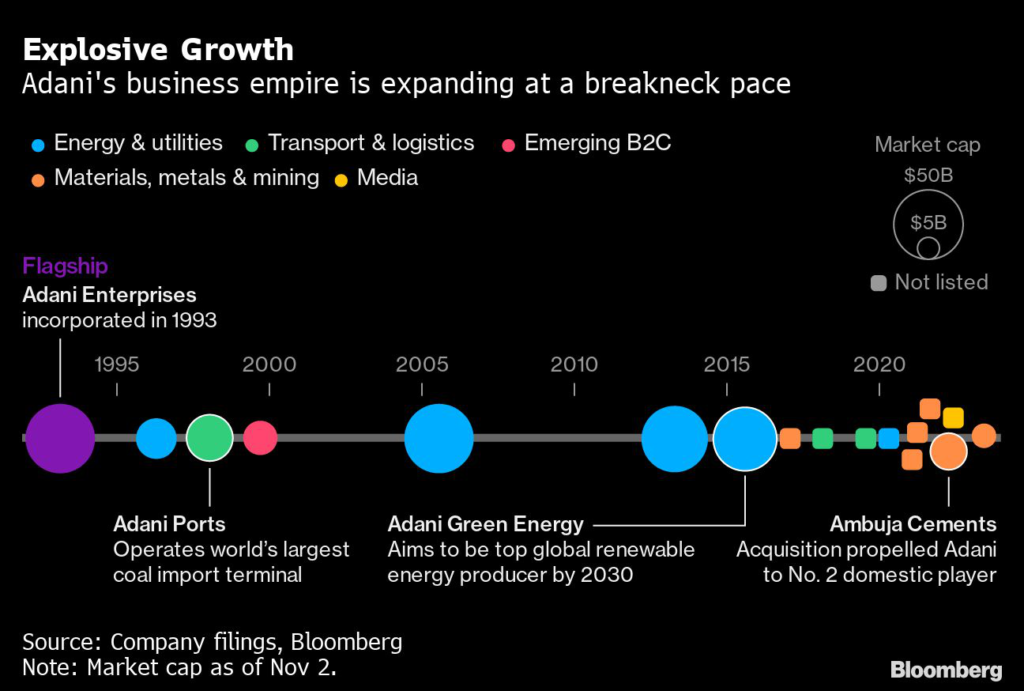Indian tycoon Gautam Adani, who added $40 billion to his wealth last year after a blistering stock rally, wants validation from the investing public and critics who question the forces pushing up his companies’ share prices.
(Bloomberg) — Indian tycoon Gautam Adani, who added $40 billion to his wealth last year after a blistering stock rally, wants validation from the investing public and critics who question the forces pushing up his companies’ share prices.
To woo mom-and-pop investors to buy into his ports-to-power empire’s flagship, Adani Enterprises Ltd. will sell new shares at a discount and allow payments in three installments when it rolls out its $2.5 billion follow-on offer later this month — an unprecedented move for one of the country’s hottest stocks. For a stock that has rallied over 1,400% since early 2020, sweeteners are crucial to woo retail investors.
The country’s biggest follow-on share sale serves many ends. A diversified shareholder base gives greater credibility in the stock market and cements Adani’s legacy as a wealth creator for millions of investors, not just himself. A bigger constituency of shareowners may trigger more analyst coverage — just two brokerages track it — of the thinly traded stock. And using a quarter of the proceeds to repay debt will mute some criticism of the empire’s elevated leverage.
“The story of Adani is story of India. Our chairman wants every Indian to be able to invest in our shares,” Adani Enterprises’ Chief Financial Officer Jugeshinder Singh told reporters Thursday. The share sale “allows us to increase the participation of the Indian public. Every household of rural India can invest in it.”
That level of retail investment is a key metric the tycoon must improve to stand shoulder-to-shoulder with other local billionaires.
Domestic mutual funds owned just 1.27% in Adani Enterprises for quarter ended September — the latest period for which the data is available with stock exchanges — while the total public shareholding was 27.37%. That compared with 5.52% shareholding by local mutual funds in Reliance Industries Ltd., India’s largest company by market value helmed by Mukesh Ambani. Non-founders owned 49.43% in Reliance in end-September.
Diamond Trader
Adani, who started as a diamond trader in Mumbai in the 1980s, now helms a conglomerate spanning ports, airports, coals mines, power plants. Following a breakneck diversification spree, he’s also now powerful in cement, realty and media, with ambitious plans in the green energy space.
Adani Enterprises is also the incubator of the group’s newer businesses, many of which are expanding rapidly and will be ready for a public listing between 2026 and 2029, according to CFO Singh.
Adani has consistently aligned his corporate strategy to the policy initiatives of the Indian government, led by Prime Minister Narendra Modi.
The billionaire is now seeking to buttress his corporate image as his businesses go global and lure overseas investors including TotalEnergeries SE and Warburg Pincus.
Adani Enterprises’ mega share sale will address the concerns of the limited free float and dominance of a few foreign portfolio investors, according to Kranthi Bathini, chief market strategist at WealthMills Securities in Mumbai.
“There are very few domestic institutional investors and retail investors in Adani stocks,” Bathini said. “This will also help to provide stability to stock prices and offer comfort for new investors.”
Adani’s flagship firm was included in the NSE Nifty 50 Index in September — the most tracked stocks gauge in the country — forcing passive funds to buy the stock.
The stock was trading at a valuation of over 141 times its one-year forward earnings while Reliance was at about 20 times as of last week, according to data compiled by Bloomberg.
The tycoon is hoping that the share sale, which opens for anchor investors on Jan. 25 and others from Jan. 27-31, will attract a high level of public interest with the discounts and installment plans on offer.
“The idea is to garner mass backing. They want to expand the shareholder base,” said Arun Kejriwal, founder at KRIS, a Mumbai-based investment advisory firm. “This helps boost the image of the company.”
–With assistance from Ashutosh Joshi.
More stories like this are available on bloomberg.com
©2023 Bloomberg L.P.










